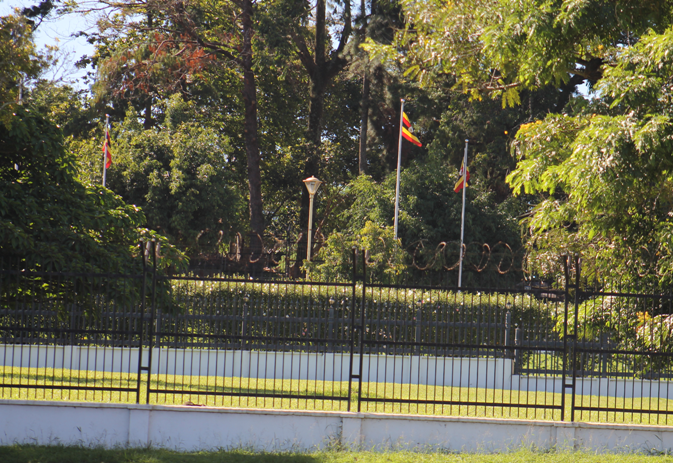“Be on your guard against the teachers of the Law, who like to walk about in long robes and love to be greeted with respect in the market place…Their punishment will be all the worse!”
Luke 20:46/47
If you are one of those who have marked the day of the Supreme Court of Uganda ruling in the Matter of Amama Mbabazi vs Yoweri K. Museveni & 2 others, you have probably picked a side in the matter. You would not be alone.
Between the yellow shirts, blue shirts and now black shirts there is not much variety of opinion on any verdict that the court will pronounce. The most middle of the line contributions that I have read are contained in the brief of the Makerere law school dons, which are worth a separate comment later. Here are some of my observations about how you might approach the ruling – and commit to more than supporting your side in this matter.
Don’t be quick to judge the Court
There are more sides in a ruling than the parties before the court. Keep this in mind when asking what impact the ruling will have. It is important to remember that courts are severely limited. They often do not speak for the public but respond in the narrow legal sense to what the parties before them have demanded. A court such as the SCOU (Supreme Court of Uganda) like any other tribunal limited by the facts before it, the parties to the dispute, how the issues have been framed, the quality of the arguments as represented by the lawyers involved, as well as the composition and inclination of the bench itself. The courts are not free of these shortcomings. To the extent that the facts are never complete a decision that follows no matter how meticulously considered shall itself be incomplete. It is like going to a doctor’s appointment and they have to rely on your stool to figure out what is causing the near fatal fevers you are periodically suffering. A better sense of the mess you are in may be better arrived at by blood work and other tissue examination coupled with an appraisal of your lifestyle and previous medical records. Since they are unavailable to the doctor, his or her conclusions will only be indicative. However much you want the court’s final decision to sum up what is wrong with the political process and the election, you must do so with these reservations. So when we talk about judicial impartiality it is moot, as lawyers say. Instead what we are insinuating is that while the courts cannot be impartial – they must try to be independent.
Be conscious of the real majority in an election- those who didn’t vote
It is tempting to think the world of the ruling revolves around you and your political choice. It does not. In the same way the court is limited so often is the very idea of your partisanship. People wake up and think the world is yellow or blue and nothing else. Free yourself from this color blindness by setting the ruling on a bigger stage. As with the first point remember that your knowledge of what transpired in the election is greater than what was argued before the court. So judge the ruling not so much for what was included but also mostly for what was excluded from the case. These include the simple fact that while approximately 10 million people voted, the recently released National Census says Uganda has over 35 million citizens. How are the interests of the silent majority who are also protected by the constitution, the courts and the law represented in your view of the courts final ruling?
Uganda is de jure a parliamentary system – not presidential one.
In October or thereabouts the Electoral Commission projected that the 2016 election cycle would conclude with the election of over 1700 officials. The figure itself is embarrassing. Uganda’s political class is close to 2 million people in total. Despite this over representation most commentators are likely to focus on the winner take all presidential system, a contest of mostly 3 main candidates. Since the election of 2006 when about 48% of incumbent MPs lost their seats, these races have shown that the promise of Uganda’s political system is in its legislative races. In 2011, 68% of sitting MPs fell and it may be worse in the 2016 race. A total of over 1600 people stood for these positions. When asking the judges to pronounce themselves on the quality of the elections over all – keep in mind these races and the primary elections before them. It is not especially intelligent to ask the court to return a ruling on the quality of the election that over turns the election for president if the same court is comfortable in sum with the multiple races. Personally I think the court lost an opportunity to order a recount of the presidential votes specifically – to be fair to the candidates in that race and not project its ruling on the entire electoral process itself.
Legal and political wins are related but not the same
For the common, especially urban Ugandan can be summed up not by what is happening in the Supreme Court but rather in Kasangati. This will not make legal sense. In fact it poses another limit to what the ruling can possibly achieve since it is obvious that a petitioner other than Rt. Hon. Amama Mbabazi may have been better suited to an argument for annulment. Instead the candidate most deserving of consideration, Dr. Besigye, is a petitioner in another room of the judiciary asking not to be declared president but allowed to resume his freedom as a citizen. In fact it does not matter how the court rules in the election petition itself since a more fundamental right is at stake here to which the justices are being asked to respond.
Law is the ideology of the state- and power.
If you think of yourself as a minority discriminated against in this election- it’s worth also looking closely about marginalization of people, and issues in general. The departure point here is that what is lawful is not always what is right. In fact periodically societies revise their values and pass new laws. The courts can then go ahead and pronounce themselves on the new status. These struggles, outside the courtroom, generally favour the rich and powerful. To that extent law represents the values, ideas and interests of power. In some cases it takes generations to correct the harm that these systems do as in when they protect negative values such as racism, tribalism or sustain corrupt and authoritarian systems. The legal system serves this organised discrimination by sanctifying norms. In turn, unquestioning citizens may not always wake up to the realization that their reference for analysis is entombed in negative norms enforced by the legal system and the state. This is one of the reasons to try and also be free of the court decision. You can agree with it or not but should jealously guard your core values and your right to revisit them regardless of what is fashionable today. I can already see how some of the arguments put forth by academia and public intellectuals on this matter are entrusted to the sterile and sometimes moral vacuum of the courtroom. For example, some have argued, that the SCOU cannot annul an election because it has not done so in the past. In so doing they simultaneously support the position that the court should dismiss this petition.
In conclusion, if you are going to claim that the court decision is predictable and in fact pre-programmed, kindly put a finger on your pulse to find out if you too are not pre-programmed yourself.










